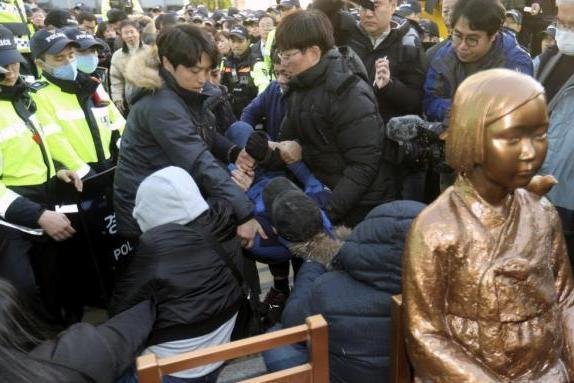A second statue dedicated to "comfort women" installed in Busan is the center of a heated dispute between Japan and South Korea. But Japanese tourists have increased in number, according to a local immigration bureau. File Photo by Yonhap
A quarrel over a new South Korean statue honoring former "comfort women" and an ongoing territorial disagreement between Seoul and Tokyo have not discouraged Japanese tourists from visiting Korea.
The Japanese government has denounced the statue, which was placed outside Tokyo's consulate in the city of Busan.
Japanese Consul to Busan Yasuhiro Morimoto, who was recalled to Tokyo, had also warned the row over the statue would lead to a drop in Japanese tourists, Yonhap TV reported on Friday.
But the latest statistics from the Busan Gimhae immigration bureau indicate the number of Japanese nationals visiting Korea was up 32.2 percent in January, year on year.
That number is also a 40 percent increase from January 2015.
The bronze statue outside the Japanese consulate in Busan is dedicated to young women and girls forced to serve in wartime Japanese brothels.
Other issues are reigniting an old feud between the two countries, including the labeling of the disputed territory known as the Dokdo or Takeshima Islets.
On Friday, Seoul said the Japanese government must immediately suspend claims over the territory, a reference to an ongoing movement in Japan to designate the islets as sovereign soil in official documents, and more recently, in school textbooks.
"The Japanese government needs to rethink [its policy]...correct historical awareness is the foundation of the Korea-Japan relationship," Seoul said, according to local news service Newsis.
In Tokyo, Japanese Foreign Minister Fumio Kishida said it was "unacceptable" Seoul was labeling the territories as "Dokdo" and the surrounding waters as the "East Sea" on its official website for the PyeongChang Winter Olympics, according to Japanese television network NHK.
The two countries, however, continue to cooperate on missile defense and began conducting missile-warning drills, along with the United States, on Friday, according to Seoul's navy.
The exercises are to continue through Sunday.















